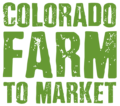Update!
Legislation was passed during the 2016 Legislative Session that changes Colorado’s Cottage Foods Act. See SB16-058 for the most current Cottage Foods Act changes.
Visit the Colorado Department of Public Health & Environment, e-mail cdphe_mfgfd@state.co.us or call (303) 692-3645, option 3, for current Cottage Foods Act information and to ask questions.
What are Cottage Foods in Colorado?
- Baked goods such as cream pies and pastries that contain cream cheese and or custard are not allowed.
- Salsa is not allowed.
- Canned fruits and applesauce are allowed.
- Pickled vegetables and fruits with a finished pH of 4.6 or below are allowed.
- Dehydrated produce includes freeze-dried produce.
Read the full text of the initial Colorado Cottage Foods Act. This Act became a state law on March 15, 2012. Additional changes were made to the Act during the 2013 Legislative Session. Visit the Act, as of April 4, 2013, by clicking here. See SB16-058 for the most current Cottage Foods Act changes.
Food Handler Training Options
The Act states that “a producer must take a food safety course that includes basic food handling training and is comparable to, or is a course given by, the Colorado state university extension service or a state, county, or district public health agency, and must maintain a status of good standing in accordance with the course requirements, including attending any additional classes if necessary.”
Face-to-Face and Online Training:
- CSU Extension Cottage Food Safety Training, various locations and dates, including online classes.
- ServSafe® Manager Certification. Face-to-face trainings and/or proctoring for certification exam. Five year certification, Cost: $120 and up.
- Contact your local public health agency, who may also offer this training.
- National Environmental Health Association’s Certified Professional Food Manager.
- StateFoodSafety.com online food handler training.
- ServSafe® Food Handler online certification from the National Restaurant Association Educational Foundation
Resources
- Visit the Colorado Department of Public Health and Environment (CDPHE) website for the latest guidance and fact sheets.
- CDPHE: Beyond Cottage Foods Fact Sheets
- Cottage Food Product Information Sheets
- FAQs on cottage food production and business development
- Cottage Food Budgeting Example
